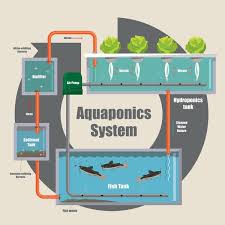
This course provides a comprehensive overview of aquaponics and integrated aquaculture systems, exploring the synergy between aquaculture and hydroponics. Students will learn the foundational concepts, practical applications, and advanced techniques to design and manage sustainable aquaponic systems effectively.
Course Levels
-
Level 1: Introduction to Aquaponics
In this introductory level, students will learn the basic principles of aquaponics, its components, and the benefits of integrating aquaculture with hydroponics.
-
Level 2: Understanding Aquaculture
This level focuses on the aquaculture aspect of aquaponics, covering fish biology, species selection, and the role of fish in nutrient cycling.
-
Level 3: Hydroponics Fundamentals
Students will explore the principles of hydroponics, including plant biology, nutrient solutions, and the integration of plants with aquaculture systems.
-
Level 4: Designing an Aquaponics System
This level teaches students how to design and set up their own aquaponics systems, including considerations for space, scale, and type of system.
-
Level 5: Managing an Aquaponics System
Students will learn about the day-to-day management of aquaponics systems, including monitoring, maintenance, and troubleshooting.
-
Level 6: Advanced Techniques in Aquaponics
This advanced level covers innovative techniques and technologies in aquaponics, enhancing efficiency and productivity.
-
Level 7: Economic and Environmental Impact
Students will analyze the economic viability and environmental sustainability of aquaponics systems in various contexts.
-
Level 8: Community and Global Perspectives
This level explores the role of aquaponics in community development and its potential to address global food security issues.
Course Topics
-
Integration with Renewable Energy
# Integration with Renewable Energy in Aquaponics The integration of renewable energy sources in aquaponics systems represents a significant advancement towards sustainable farming practices. This to...
-
Vertical Aquaponics Systems
# Vertical Aquaponics Systems ## Introduction Vertical aquaponics is an innovative method of growing fish and plants together in a symbiotic environment, utilizing vertical space to maximize producti...
-
Cost-Benefit Analysis of Aquaponics
# Cost-Benefit Analysis of Aquaponics ## Introduction Cost-benefit analysis (CBA) is a systematic approach to estimating the strengths and weaknesses of alternatives in business decisions. In the con...
-
What is Aquaponics?
# What is Aquaponics? Aquaponics is a sustainable agricultural practice that combines aquaculture (the cultivation of fish) and hydroponics (the growing of plants in water without soil). This innovat...
-
Water Quality Management
# Water Quality Management Water quality management is a vital aspect of aquaculture and aquaponics, as the health of aquatic organisms is directly influenced by the quality of the water in which the...
-
Growing Media and Systems
# Growing Media and Systems Growing media play a crucial role in hydroponics and aquaponics. They provide support for plants, retain moisture, and facilitate nutrient uptake. In this section, we will...
-
Case Studies of Successful Aquaponics Businesses
# Case Studies of Successful Aquaponics Businesses Aquaponics is an innovative agricultural practice that combines aquaculture (raising fish) and hydroponics (growing plants in water without soil) in...
-
Aquaponics in Urban Settings
# Aquaponics in Urban Settings ## Introduction to Aquaponics Aquaponics is a sustainable agricultural method that combines aquaculture (raising fish) and hydroponics (growing plants in water) in a sy...
-
Disease Management in Fish
# Disease Management in Fish Disease management is a critical aspect of aquaculture, ensuring the health and productivity of fish populations. In this section, we will explore various aspects of dise...
-
Layout and Infrastructure
# Layout and Infrastructure in Aquaponics Designing an aquaponics system involves careful consideration of layout and infrastructure to ensure optimal plant growth and fish health. The layout of your...
-
Benefits of Aquaponics
# Benefits of Aquaponics Aquaponics is a sustainable farming method that combines aquaculture (raising fish) and hydroponics (growing plants in water). This integrated system offers a variety of bene...
-
Fish Nutrition and Feeding
# Fish Nutrition and Feeding Fish nutrition is a critical aspect of aquaculture that affects growth, health, and overall production efficiency. Understanding the nutritional requirements of fish spec...
-
Monitoring Water Quality
# Monitoring Water Quality ## Introduction In aquaponics systems, maintaining optimal water quality is crucial for the health and productivity of both fish and plants. Water quality directly affects ...
-
Fish Species for Aquaponics
# Fish Species for Aquaponics Aquaponics combines fish farming (aquaculture) with plant cultivation (hydroponics) in a symbiotic environment. The choice of fish species is crucial for a successful aq...
-
Components of Aquaponics Systems
# Components of Aquaponics Systems Aquaponics is a sustainable farming method that combines aquaculture (raising fish) and hydroponics (growing plants in water) into one integrated system. Understand...
-
Plant Selection for Aquaponics
# Plant Selection for Aquaponics Aquaponics is a sustainable agricultural practice that combines aquaculture (raising fish) with hydroponics (growing plants in water). One of the most critical aspect...
-
Aquaponics Automation and Technology
# Aquaponics Automation and Technology ## Introduction to Aquaponics Automation Aquaponics is a sustainable food production system that combines aquaculture (raising fish) and hydroponics (growing pl...
-
Hydroponics Basics
# Hydroponics Basics Hydroponics is a method of growing plants without soil, using mineral nutrient solutions in an aqueous solvent. This technique allows for the cultivation of plants in a controlle...
-
System Design Principles
# System Design Principles When designing an aquaponics system, understanding the foundational principles of system design is crucial. This ensures not only the efficiency of the system but also its ...
-
Harvesting and Production Cycles
# Harvesting and Production Cycles in Aquaponics Managing an aquaponics system effectively requires a deep understanding of the harvesting and production cycles. This section will cover the key compo...
- And 20 more topics...